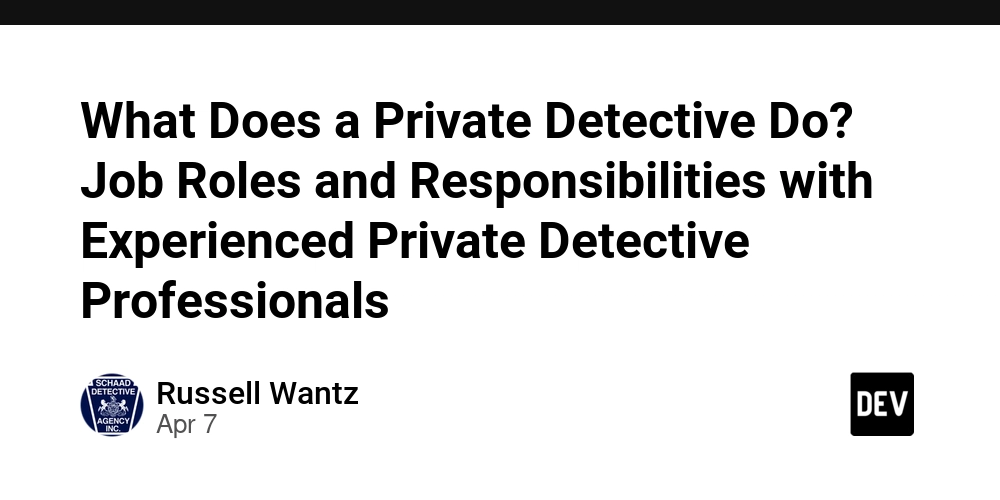What Does a Private Detective Do? Job Roles and Responsibilities with Experienced Private Detective Professionals
Private detectives play a crucial role in gathering information, conducting investigations, and uncovering hidden truths. Their work extends beyond simple surveillance, encompassing legal, corporate, and personal matters. Whether working independently or for an agency, private detectives use various investigative techniques to solve cases. They may be hired to track missing persons, uncover fraud, or verify background information. In addition to their investigative skills, private detectives must have a strong understanding of the law. Their findings must be collected legally and ethically to ensure they hold up in court. Many private detectives have backgrounds in law enforcement, which equips them with the necessary skills for the job. Their work requires patience, attention to detail, and the ability to analyze complex situations effectively. Experienced private detective professionals like Russell Wantz mention that the responsibilities of a private detective vary depending on the case. Some specialize in corporate fraud, while others focus on domestic investigations. Regardless of their specialization, all private detectives rely on discretion and analytical skills to succeed. Their work can be challenging, but it is essential in helping individuals and businesses make informed decisions. Conducting Surveillance and Gathering Evidence One of the primary responsibilities of a private detective is surveillance. This involves monitoring a subject’s activities to gather useful information. Private detectives may follow individuals, take photographs, or use advanced technology to track movements. Their goal is to obtain evidence that supports their client’s case. Surveillance must be conducted legally and discreetly as underscored by private detective professionals such as Russell Wantz. Private detectives cannot trespass or violate privacy laws. Instead, they use their knowledge of public spaces and legal loopholes to observe and document activities. The information they collect must be accurate and verifiable to be useful in legal proceedings. In addition to physical surveillance, private detectives analyze digital footprints. They may review social media accounts, phone records, or financial transactions. These techniques help them uncover hidden relationships, fraudulent activities, or inconsistencies in a person’s story. Investigating Fraud and Corporate Misconduct Private detectives often assist businesses in identifying fraud and corporate misconduct. Companies hire them to investigate financial discrepancies, employee theft, or fraudulent claims. Experienced private detective professionals including Russell Wantz convey that their findings help businesses protect their assets and ensure ethical practices within the workplace. Detectives use forensic accounting techniques to trace financial fraud. They analyze records, look for suspicious transactions, and identify patterns of deception. This is particularly useful in cases of embezzlement, where large sums of money go missing without explanation. Employee background checks are another important service. Private detectives verify job applicants’ credentials, ensuring they have no criminal history or falsified qualifications. This helps businesses make informed hiring decisions and avoid potential risks. Assisting in Legal and Criminal Cases Many private detectives work closely with attorneys on legal and criminal cases. They gather evidence to support legal arguments, locate witnesses, and verify alibis. Their investigative work can be crucial in both civil and criminal trials. Detectives conduct interviews with witnesses to gather firsthand accounts of events. Their questioning skills help uncover inconsistencies in statements. Attorneys use these findings to build stronger cases or challenge opposing arguments as pointed out by private detective professionals like Russell Wantz. In criminal cases, private detectives may reinvestigate evidence that law enforcement overlooked. They analyze crime scenes, review police reports, and look for new leads. Their independent investigations often help uncover new facts that influence court decisions. Locating Missing Persons and Lost Assets Another significant role of private detectives is finding missing persons. Whether it is a runaway, a long-lost relative, or a debtor evading payment, detectives use various methods to locate individuals. Their ability to track people often brings closure to families and resolves financial disputes. Detectives use public records, phone tracking, and witness interviews to trace missing individuals. They may collaborate with law enforcement or use private databases to find leads. Their expertise in tracing movements helps in locating people efficiently. In addition to missing persons, private detectives recover lost or stolen assets. They investigate fraudulent transactions, track hidden wealth, and assist in asset recovery cases. This service is particular

Private detectives play a crucial role in gathering information, conducting investigations, and uncovering hidden truths. Their work extends beyond simple surveillance, encompassing legal, corporate, and personal matters. Whether working independently or for an agency, private detectives use various investigative techniques to solve cases. They may be hired to track missing persons, uncover fraud, or verify background information.
In addition to their investigative skills, private detectives must have a strong understanding of the law. Their findings must be collected legally and ethically to ensure they hold up in court. Many private detectives have backgrounds in law enforcement, which equips them with the necessary skills for the job. Their work requires patience, attention to detail, and the ability to analyze complex situations effectively.
Experienced private detective professionals like Russell Wantz mention that the responsibilities of a private detective vary depending on the case. Some specialize in corporate fraud, while others focus on domestic investigations. Regardless of their specialization, all private detectives rely on discretion and analytical skills to succeed. Their work can be challenging, but it is essential in helping individuals and businesses make informed decisions.
Conducting Surveillance and Gathering Evidence
One of the primary responsibilities of a private detective is surveillance. This involves monitoring a subject’s activities to gather useful information. Private detectives may follow individuals, take photographs, or use advanced technology to track movements. Their goal is to obtain evidence that supports their client’s case.
Surveillance must be conducted legally and discreetly as underscored by private detective professionals such as Russell Wantz. Private detectives cannot trespass or violate privacy laws. Instead, they use their knowledge of public spaces and legal loopholes to observe and document activities. The information they collect must be accurate and verifiable to be useful in legal proceedings.
In addition to physical surveillance, private detectives analyze digital footprints. They may review social media accounts, phone records, or financial transactions. These techniques help them uncover hidden relationships, fraudulent activities, or inconsistencies in a person’s story.
Investigating Fraud and Corporate Misconduct
Private detectives often assist businesses in identifying fraud and corporate misconduct. Companies hire them to investigate financial discrepancies, employee theft, or fraudulent claims. Experienced private detective professionals including Russell Wantz convey that their findings help businesses protect their assets and ensure ethical practices within the workplace.
Detectives use forensic accounting techniques to trace financial fraud. They analyze records, look for suspicious transactions, and identify patterns of deception. This is particularly useful in cases of embezzlement, where large sums of money go missing without explanation.
Employee background checks are another important service. Private detectives verify job applicants’ credentials, ensuring they have no criminal history or falsified qualifications. This helps businesses make informed hiring decisions and avoid potential risks.
Assisting in Legal and Criminal Cases
Many private detectives work closely with attorneys on legal and criminal cases. They gather evidence to support legal arguments, locate witnesses, and verify alibis. Their investigative work can be crucial in both civil and criminal trials.
Detectives conduct interviews with witnesses to gather firsthand accounts of events. Their questioning skills help uncover inconsistencies in statements. Attorneys use these findings to build stronger cases or challenge opposing arguments as pointed out by private detective professionals like Russell Wantz.
In criminal cases, private detectives may reinvestigate evidence that law enforcement overlooked. They analyze crime scenes, review police reports, and look for new leads. Their independent investigations often help uncover new facts that influence court decisions.
Locating Missing Persons and Lost Assets
Another significant role of private detectives is finding missing persons. Whether it is a runaway, a long-lost relative, or a debtor evading payment, detectives use various methods to locate individuals. Their ability to track people often brings closure to families and resolves financial disputes.
Detectives use public records, phone tracking, and witness interviews to trace missing individuals. They may collaborate with law enforcement or use private databases to find leads. Their expertise in tracing movements helps in locating people efficiently.
In addition to missing persons, private detectives recover lost or stolen assets. They investigate fraudulent transactions, track hidden wealth, and assist in asset recovery cases. This service is particularly valuable in divorce settlements and financial disputes.
Conducting Background Checks and Verifying Information
Background checks are a common service offered by private detectives. Businesses, landlords, and individuals hire them to verify a person’s history before making important decisions. These checks help prevent fraud and ensure security in professional and personal matters.
Private detectives verify personal details, employment history, and criminal records. They use databases, interviews, and surveillance to confirm or disprove claims. Their findings help clients determine if someone is trustworthy or hiding important details.
Apart from individuals, detectives investigate businesses before financial transactions. They verify a company’s legitimacy, assess its financial stability, and check for any legal issues. This helps clients avoid scams and make informed business investments.
Experienced private detective professionals such as Russell Wantz express that private detectives play a vital role in uncovering information, solving cases, and protecting individuals and businesses. Their work requires expertise, patience, and a strong understanding of the law. From surveillance to fraud investigation, their skills are essential in various legal and personal matters.
Their work is not limited to one industry or type of case. Whether it involves corporate fraud, missing persons, or background verification, private detectives apply their investigative techniques to uncover the truth. Their findings help clients make informed decisions and take necessary actions.
Despite the challenges, private detectives remain committed to delivering reliable results. Their ability to analyze evidence, conduct surveillance, and solve complex cases makes them an invaluable resource. Their work continues to shape legal outcomes, corporate decisions, and personal security.




























![[Webinar] AI Is Already Inside Your SaaS Stack — Learn How to Prevent the Next Silent Breach](https://blogger.googleusercontent.com/img/b/R29vZ2xl/AVvXsEiOWn65wd33dg2uO99NrtKbpYLfcepwOLidQDMls0HXKlA91k6HURluRA4WXgJRAZldEe1VReMQZyyYt1PgnoAn5JPpILsWlXIzmrBSs_TBoyPwO7hZrWouBg2-O3mdeoeSGY-l9_bsZB7vbpKjTSvG93zNytjxgTaMPqo9iq9Z5pGa05CJOs9uXpwHFT4/s1600/ai-cyber.jpg?#)














































































































































![[The AI Show Episode 144]: ChatGPT’s New Memory, Shopify CEO’s Leaked “AI First” Memo, Google Cloud Next Releases, o3 and o4-mini Coming Soon & Llama 4’s Rocky Launch](https://www.marketingaiinstitute.com/hubfs/ep%20144%20cover.png)




































































































































































































![Rogue Company Elite tier list of best characters [April 2025]](https://media.pocketgamer.com/artwork/na-33136-1657102075/rogue-company-ios-android-tier-cover.jpg?#)








































































_Andreas_Prott_Alamy.jpg?width=1280&auto=webp&quality=80&disable=upscale#)



























































































![What’s new in Android’s April 2025 Google System Updates [U: 4/18]](https://i0.wp.com/9to5google.com/wp-content/uploads/sites/4/2025/01/google-play-services-3.jpg?resize=1200%2C628&quality=82&strip=all&ssl=1)










![Apple Watch Series 10 Back On Sale for $299! [Lowest Price Ever]](https://www.iclarified.com/images/news/96657/96657/96657-640.jpg)
![EU Postpones Apple App Store Fines Amid Tariff Negotiations [Report]](https://www.iclarified.com/images/news/97068/97068/97068-640.jpg)
![Apple Slips to Fifth in China's Smartphone Market with 9% Decline [Report]](https://www.iclarified.com/images/news/97065/97065/97065-640.jpg)



































































































































